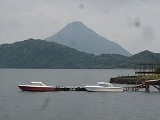
Lake Ikeda
Encyclopedia
is a caldera lake located 40 km south of Kagoshima city; Kyūshū
island, Japan
. It is perhaps best known to tourists as the location of the purported sightings of a monster named Issie
, and as the largest lake on Kyūshū island with a surface area of 11 km² and a shoreline length of 15 km.
.jpg) Lake Ikeda is known to harbour large eels, some six feet in length. In 1998, a benthological survey was conducted in the lake, which found that there were no zoobenthos, although two tubificid oligochaetes and a chironomid were found. The lake was already considered oligotroph
Lake Ikeda is known to harbour large eels, some six feet in length. In 1998, a benthological survey was conducted in the lake, which found that there were no zoobenthos, although two tubificid oligochaetes and a chironomid were found. The lake was already considered oligotroph
ic until the 1940s, but one theory for the further drop in underwater life is that the existing life in Lake Ikeda has been affected by Global Warming
.
Kyushu
is the third largest island of Japan and most southwesterly of its four main islands. Its alternate ancient names include , , and . The historical regional name is referred to Kyushu and its surrounding islands....
island, Japan
Japan
Japan is an island nation in East Asia. Located in the Pacific Ocean, it lies to the east of the Sea of Japan, China, North Korea, South Korea and Russia, stretching from the Sea of Okhotsk in the north to the East China Sea and Taiwan in the south...
. It is perhaps best known to tourists as the location of the purported sightings of a monster named Issie
Issie
is a legendary Japanese lake monster; said to lurk in Lake Ikeda, on Kyushu Island. It is described as being saurian in appearance. The name is formed in analogy with "Nessie" .-Mythology:...
, and as the largest lake on Kyūshū island with a surface area of 11 km² and a shoreline length of 15 km.
Deterioration
The development of the areas surrounding Lake Ikeda has caused the quality of the water to decline since 1955. Other causes include an irrigation project, developed for agricultural field and households in the area, which was initiated in 1965, for it the courses of three nearby rivers were diverted into the lake. The irrigation system has been in operation since 1982, resulting in a considerable improvement of the water quality although since the 1950s the transparency of the lake, though still ranked No. 7 in the world, has decreased from 26.8 m to approximately 5m.Animals
.jpg)
Oligotroph
An oligotroph is an organism that can live in an environment that offers very low levels of nutrients. They may be contrasted with copiotrophs, which prefer nutritionally rich environments...
ic until the 1940s, but one theory for the further drop in underwater life is that the existing life in Lake Ikeda has been affected by Global Warming
Global warming
Global warming refers to the rising average temperature of Earth's atmosphere and oceans and its projected continuation. In the last 100 years, Earth's average surface temperature increased by about with about two thirds of the increase occurring over just the last three decades...
.

